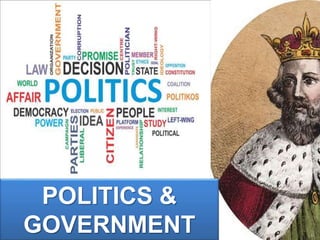
Politics and government(sociology)
- 2. Md. Sajib Chowdhury ID No: 16411069 Section: A Department of International Relations Faculty of Security and Strategic Studies (FSSS) Bangladesh University of Professionals
- 3. KEY CONTENTS POWER & AUTHORITY 3 Types of Authority POLITICS IN GLOBAL PERSPECTIVES Types of Politics THEORIES OF POWER IN SOCIETY
- 4. POWER AND AUTHORITY :SOCIOLOGICAL CONCEPTS POLITIC POWER MICROPOLITICS MACROPOLITIC S LEGITIMATE POWER ILLIGETIMATE POWER GOVERNMEN T AUTHORIT Y
- 5. POWER AND AUTHORITY • Essentially, politics is associated with the govt, kings, queens, coups, dictatorship, voting , etc. But the term actually has a much broader meaning. • Definition of Politics – polity : Is the social institutions that distributes power, sets a society’s goals and make decision. : the exercise of power and attempts to maintain or to change power relations.
- 6. • – Max Weber claimed that every society is based on power. –Power is the ability to achieve desired ends despite resistance from others. –Power is the ability to carry out one’s will, even over the resistance of others. –Power struggles – workers with their bosses, power struggle within family members, (all these attempts to gain or keep power) these also consider as political actions. Definition of Power
- 7. • Therefore, in our everyday life, we practice power. Additionally, the elements of power according to symbolic interactionist could be categorized into two: i) Micropolitics – to refer to the exercise of power in everyday life ii) Macropolitics – refers to the exercise of power over a large group E.g.: the governments; whether dictatorship or democracies, they are the examples of macropolitics.
- 8. POWER AND AUTHORITY • For every society development, it is inevitably for a society to encompassed a system of leadership. • Some people must have power over others • Weber perceive power into two type that is legitimate power and illegitimate power. –Legitimate power : is called as authority i.e. power people accept as right. –Illegitimate power : known as coercion i.e. power that people do not accept as just.
- 9. POWER AND AUTHORITY • The use of power is the business of government. Government is a formal organization that directs the political life of a society. • How do government try to make itself seem legitimate in the eyes of the people? • Through – “authority” as mentioned by Weber. • Authority - power that people perceive as legitimate rather than coercive. This relations of power authority is legitimate • How do governments transform raw power into more stable authority?
- 10. POWER AND AUTHORITY : Types of Authority Traditional Authority Rational Legal Authority Charismatic Authority
- 11. Traditional Authority • Traditional Authority; power legitimized by respect for long-established cultural patterns. • Characteristics of Traditional Authority: a) preindustrial societies b) populations collective memory – people’s accept a system c) usually one of hereditary leadership d) strong power in political system, absolute power and almost godlike e) Source of strength for patriarchy, domination by men
- 12. • Examples of Traditional Authority: - Chinese emperors - Aristocratic rulers in medieval Europe • Traditional authority declines as societies industrialize. • Traditional authority remains strong only as long as everyone shares the same belief and way of life (Hannah Arendt,1963). • How ? a) Through modern scientific thinking, b) the specialization demanded by industrial production and, c) the social changes and, d) the cultural diversity resulting immigration all combine to weaken tradition.
- 13. Rational Legal Authority • Weber defined rational legal authority (bureaucratic authority) :as power legitimized by legally enacted rules and regulations. • Rational legal authority is power legitimized in the operation of lawful government. • Weber viewed bureaucracy as the type of organization that dominates in rational thinking, modern societies. • Members of today’s high income societies seek justice through the operation of a political system that follows formally enacted rules of law. • Rationally enacted rules also guide the use of power in everyday life.
- 14. Examples of Rational Legal Authority: a) The authority of deans / classroom teachers/ lecturers – rests on the offices they hold in bureaucratic colleges and universities b) The police officer / police traffic / security guard in uniform possessed rational legal authority
- 15. Charismatic Authority • Charismatic authority: is power legitimized by extraordinary personal abilities that inspire devotion and obedience. • Charismatic authority depends less on a person’s ancestry or office and more on personality. • Charismatic authority characteristics: a) using their personal skills to turn an audience into followers b) make their own rules and challenge the status quo
- 16. a) Prophet Mohammad b) Jesus of Nazareth c) Adolf Hitler d) India’s liberator, Mahatma Gandhi e) US civil rights leader Martin Luther King Jr. • Charismatic authority flows from a single individual, the leaders death creates a crisis. • Survival of a charismatic movement, Weber explained, requires the “routinization of charisma” – the transformation of charismatic authority into some combination of traditional and bureaucratic authority. Examples:
- 17. POLITICS IN GLOBAL PERSPECTIVES : Types of Politics Monarchy Democrac y Authoritari- anism Totalitarianism Dictatorship & Oligarchies Types of Governments
- 18. MONARCHY VS.DEMOCRACY ASPECT MONARCHY DEMOCRACY RULER Single ruler Collective / majority ruler SELECTION OF THE RULER Ascribed status Inheritance / singles family rules from generation to gen. Achieved status Election / people’s decision RULING SYSTEM / RULING MECHANISM Royal Only few line Legislative, judiciary and executive TYPE Traditional political system Modern political system POLITICAL RIGHTS Right and power meant to the royal families No freedom of speech Right and power to the people Stress on the freedom of speech TYPE OF AUTHORITY Traditional authority Rational-legal